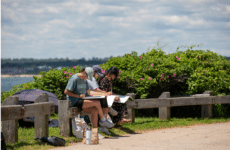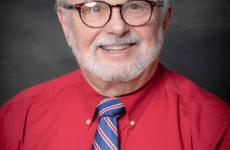By Marrissa Ballard | Co-Editor-in-Chief
On Saturday morning, a crowd gathered in Eisenhower Park for the “We Are Water” Rally to stand in solidarity with Standing Rock, North Dakota. The rally included speeches by politicians, professors, and activists, as well as music from singers and drummers from the Soaring Eagle Singers, a group affiliated with the Aquidneck Intertribal Indian Council. Chief Don Sly, also known as 3 Horses Sly Fox, opened the event with a speech and prayer.
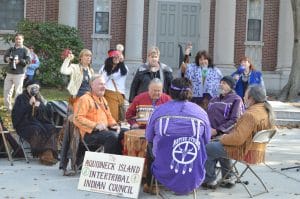
Standing Rock has been in national headlines recently during the ongoing struggle between Native Americans and authorities over the construction of the Dakota Access Pipeline, which would transport oil from North Dakota to Illinois. Originally, the pipeline was planned to route through Bismark, North Dakota, until the residents voiced safety concerns. The pipeline was then re-routed to travel under the Missouri River, which is the main source of water for the Standing Rock Sioux reservation.
As others saw the struggle between the Standing Rock Sioux and the DAPL, they began showing support with the hashtag “#NODAPL,” which has trended on all social media platforms as more people join the conversation. The Sisters of Mercy posted a message on November 2nd detailing their own support for Standing Rock, and their intention to oppose construction of the pipeline.
Christian Hopkins, a Rhode Island resident and member of the Narragansett Nation, attended the rally to voice his own opinions about the construction project. 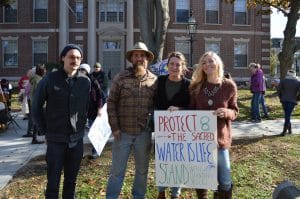 The first point he made was to change the language that mainstream media has used to describe the natives in Standing Rock. “We’re not protesters,” Hopkins says. “We’ve been called protesters, but we’re here to protect the water for future generations.”
The first point he made was to change the language that mainstream media has used to describe the natives in Standing Rock. “We’re not protesters,” Hopkins says. “We’ve been called protesters, but we’re here to protect the water for future generations.”
In September, Hopkins traveled to Standing Rock to help protect the water and donate to the Oceti Sakowin Sacred Water School. He asked the crowd to consider donating to his GoFundMe page, which will also fund the school, before he returns to Standing Rock this November. “The children are the backbone,” says Hopkins. The school will help educate native children on the sacredness of water, which is another important aspect of the debate surrounding the pipeline.
The school is open to children from 4 to 14 years old, and this adds a darker tone to the events in Standing Rock. “When you see all this news of police spraying the people and shooting rubber bullets, they are shooting at 4 and 14-year-old children,” says Hopkins. “We’re standing out on the front lines, looking into the eyes of police officers who tell us that we have no right to be there.”
Hopkins also emphasized that the problems seen at Standing Rock are affecting indigenous communities right here in Rhode Island. “The sacred sites that are being desecrated by the Dakota access pipeline are the same scared sites that were desecrated when they built the Newport Mansions,” says Hopkins.
He ended his speech by strongly asserting, “We’re not looking for pity, we’re looking for respect. When you stand together, you make a statement of solidarity. With one voice, things can get done.”
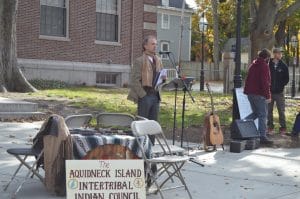 This concept of solidarity formed the basis of the entire event. Kyle Hence, one of the organizers of the rally, wanted to see everyone work together to oppose the DAPL. “We’re all denizens of the Earth,” says Hence. “There’s so much division in the country now, it’s vital for us to come together in solidarity who are standing up against this oil pipeline.”
This concept of solidarity formed the basis of the entire event. Kyle Hence, one of the organizers of the rally, wanted to see everyone work together to oppose the DAPL. “We’re all denizens of the Earth,” says Hence. “There’s so much division in the country now, it’s vital for us to come together in solidarity who are standing up against this oil pipeline.”
In addition to the rally, Hence hopes to organize more events to bring the community together, such as a benefit concert. Supporters are also welcome to come to Gather, an herbal shop downtown, to create herbal care packages for the people in Standing Rock. “Let water bring us together, and let us stand together today in support of the water protectors in Standing Rock,” Hence says. “I believe this is bigger than we know.”
Dr. Jordan Miller, an adjunct professor at Salve and one of the organizers of the rally, noted that while solidarity is important, it’s “empty, when it’s talk.
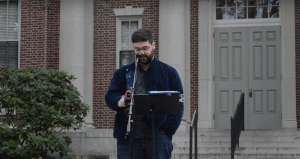 “We can all show up at this rally and say that ‘Aquidneck Stands with Standing Rock’ and that’s good as far as it goes, but it doesn’t go particularly far,” says Miller. He then asked the community to show their support with action, which included ceasing any business with financial institutions that fund the Dakota Access project, such as Citi Bank, Bank of America, Wells Fargo, and many others. Miller called on businesses and town governments to stop doing business with the “makers of war against native people.”
“We can all show up at this rally and say that ‘Aquidneck Stands with Standing Rock’ and that’s good as far as it goes, but it doesn’t go particularly far,” says Miller. He then asked the community to show their support with action, which included ceasing any business with financial institutions that fund the Dakota Access project, such as Citi Bank, Bank of America, Wells Fargo, and many others. Miller called on businesses and town governments to stop doing business with the “makers of war against native people.”
In his speech, Miller gave a brief history of the interactions between native nations, colonists, and corporations. He began at the beginning, in the 15th and 16th Century, when Europeans sailed to America, which was then named Turtle Island. “Every new step of white people’s impact on this continent has reinforced white disrespect for native people,” Miller says. “Today, when the white corporation explores possible routes for its black gold, it heeds the concerns of good white folks at the expense of native people. It once was about gold in the Black Hills, now it is about black gold moving under the river.”
Miller also spoke about the involvement of authorities at Standing Rock. “The corporations’ wishes are enforced by police and the National Guard; profit has turned public servants into corporate security,” he says. “The presence of militarized police at Standing Rock should be understood as a military invasion of sovereign nation on behalf of a foreign company.”
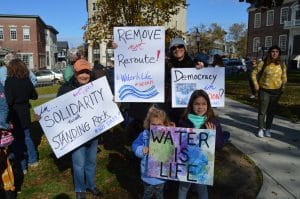 Miller concluded his speech by emphasizing that what is happening in Standing Rock is not a new event. “It is merely a single moment in a 500 year-long and unbroken process of white people extracting resources from native land and people for profit,” says Miller.
Miller concluded his speech by emphasizing that what is happening in Standing Rock is not a new event. “It is merely a single moment in a 500 year-long and unbroken process of white people extracting resources from native land and people for profit,” says Miller.
Like many of the speakers at the event, Miller also pointed out that the issues in Standing Rock are connected to issues right here in Newport. “It is our colonial history which continues to make us our money, but which stands in opposition to the interests of native people in Standing Rock,” he says. “From Columbus who physically stands over our city, to the Gilded Age which still serves as our principal tourist draw, to our colonial downtown built on the slave trade, to our current investment in the banks that fund the war against Standing Rock, we have met the enemy, and it is us.”
Throughout his speech and in its concluding line, Miller asserted an important point. “While we say water is life, we must also remember that oil is death,” he says.
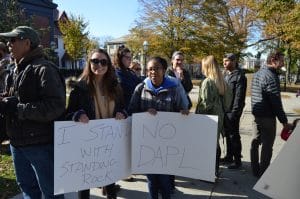 The speeches proved to inspire the students who attended the rally and represented Salve Regina. Junior Sociology and Anthropology major Jessi McNeill saw the event on Facebook and knew she wanted to go. “I decided that it was just too important to pass up,” says McNeill. “I wish I could be there in Standing Rock, but since I can’t I felt like this was a really good start.”
The speeches proved to inspire the students who attended the rally and represented Salve Regina. Junior Sociology and Anthropology major Jessi McNeill saw the event on Facebook and knew she wanted to go. “I decided that it was just too important to pass up,” says McNeill. “I wish I could be there in Standing Rock, but since I can’t I felt like this was a really good start.”
“I think injustices have been going on for way too long, and that this is just another piece of history,” McNeill says. “I think it has to do with systemic racism. I think this is a human rights issue that needs to be solved on a deeper level, and if we don’t talk about it then there’s no way that it can even begin to be solved.”
Molly Corley, a senior political science major, was most upset that issues like this are still happening. “The fact that this is still going on is ridiculous,” she says. “We need to stand up and put a stop to it.”
Junior administration of justice major Bernadette Maligranda agreed that the community needs to speak out. She also noted the importance of respecting one another. “I just believe that we should be respecting people all across the nation,” says Maligranda. “We all should be respecting our resources, because it’s vital to our life.”
Martha Nunes, a member of the Soaring Eagle Singers also known by her native name Yannash Ushi, joined the movement when she saw that the demonstrators were being denied water. “That’s a civil rights issue, and a human rights issue,” says Ushi. Immediately she contacted her state representatives, but in return she received a letter instead of action.
For Ushi, the rally was important because it started conversations. “I think that any time people get together and exercise their right for assembly is paramount for our society,” she says. “It was a great time for people to connect and talk to each other and get the information out. I believe in energy, I believe we’re all connected, and I think this was like turning a light switch.”

